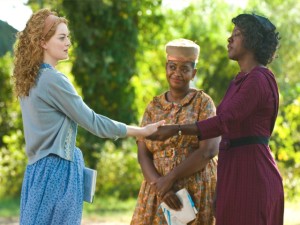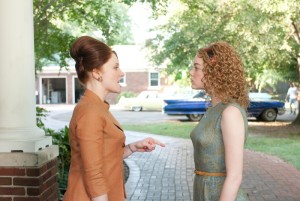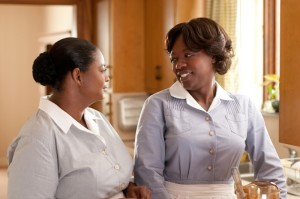We have interviews with the stars and director of the film, but now hear what our movie reviewer thinks. Jeanne reviews “The Help.”
RELATED VIDEO: SIDEWALKS host Maaika Westen has separate interviews with Emma Stone and director Tate Taylor and Octavia Spencer.

THE HELP
DREAMWORKS PICTURES and PARTICIPANT MEDIA
Genre: Drama
Rating: PG-13
Running Time: 137 mins.
Cast: Jessica Chastain, Viola Davis, Bryce Dallas Howard, Allison Janney, Chris Lowell, Sissy Spacek, Octavia Spencer, Emma Stone, Cicely Tyson, Mike Vogel
Director: Tate Taylor
Studio Synopsis:
Based on one of the most talked about books in years and a #1 New York Times best-selling phenomenon, “The Help” stars Emma Stone (“Easy A”) as Skeeter, Academy Award®–nominated Viola Davis (“Doubt”) as Aibileen and Octavia Spencer as Minny—three very different, extraordinary women in Mississippi during the 1960s, who build an unlikely friendship around a secret writing project that breaks societal rules and puts them all at risk. From their improbable alliance a remarkable sisterhood emerges, instilling all of them with the courage to transcend the lines that define them, and the realization that sometimes those lines are made to be crossed—even if it means bringing everyone in town face-to-face with the changing times.
Deeply moving, filled with poignancy, humor and hope, “The Help” is a timeless and universal story about the ability to create change.
Film Trailer:
[youtube]http://www.youtube.com/watch?v=3eajzW3XW7Q&feature=relmfu[/youtube]

Jeanne’s Take:
Tate Taylor is another actor turned director, in the tradition of Warren Beatty and Robert Redford, and he gets it right in his first film, “The Help,” starring Emma Stone, Viola Davis and Octavia Spencer, with special appearances by Sissy Spacek and Cicely Tyson.
Taylor directs from a best-selling novel by Kathryn Stockett. These two grew up together in Jackson, Mississippi. Both have close memories of African-American domestics who made a significant difference in their lives; Stockett was co-parented by Demetri (beautifully played by Cicely Tyson as “Constantine” in the film), and Taylor was co-parented by Carol Lee. Taylor and Stockett are intimately familiar with the peculiar social climate of the south in the 1960s, and their collaboration brings to life a powerful story: two African-American housekeepers sit down with a local white writer, who has asked them to talk about their lives as invisible servants in the households of the white middle class when racial segregation was the norm.
Like so much of life, their experiences involve wicked humor juxtaposed with visceral pain. A servant is entrusted with the life of your child, but cannot be trusted to polish the silver. She spends eight hours a day cleaning and cooking in your home but can’t use the bathroom. One Junior League diva, ably played by Bryce Dallas Howard as Hilly, goes so far as to build a separate toilet on the outside of her home for the sole use of her African-American domestic, while her husband grumbles about the cost. And I will not give away the hilarious revenge taken by one housekeeper upon her employer when she is fired.
The immediate reality is that clandestine meetings between Skeeter (Emma Stone), Aibileen (Viola Davis) and Minny (Octavia Spencer) must be secret to prevent the maids from losing their jobs, or receiving even worse punishment. Skeeter parks her car blocks away from Aibileen’s home. When she serves Skeeter tea and cookies in her home on that first visit, Aibileen takes a nervous breath and says it is the first time a white woman has visited her home.

Period details from the novel are fully present in this engaging film – cigarette smoking, homemade dresses, women’s hair in big rollers, cooking with Crisco, gleaming vintage cars, classic rock/folk music, and separate realities for men and women.
That separate reality for men and women is what brought about a surprise alliance between white women and African-American women who worked as their maids. Sissy Spacek’s brief appearance in “The Help” (as Hilly’s mother) reminds us that she starred in “The Long Walk Home” with Whoopi Goldberg in 1990, where the relationship between wife (Spacek) and domestic (Goldberg) is changed forever by the Birmingham, Alabama bus boycott of 1955-1956. White men decide to ride out the boycott, confident that African-Americans cannot win, since wages earned by domestics are crucial to the survival of minority families. Southern white women upset their husbands’ political applecart, however — the wives say they will not do their own housework, or cook or care for their own children in the notorious southern heat and humidity. If their maids cannot get to them because of the boycott, then they will drive into African-American neighborhoods and chauffer their maids to and from work. And in “The Help,” we see that middle class wives’ dependence on their minority housekeepers is greater than ever in the early 1960s, with results sometimes sad and sometimes truly hilarious.
Grounding this excellent film in historical context is newsreel coverage of two brutal assassinations – NAACP leader and World War II veteran Medgar Evers gunned down in the driveway of his home as punishment for his civil rights activity, and President John F. Kennedy later that same year. President Kennedy brought Mrs. Myrlie Evers and her children to the White House after her husband’s murder, and arranged for Evers to be buried in Arlington National Cemetery.

Emma Stone as Eugenia “Skeeter” Phelan already had people buzzing about her due to performances in “Crazy, Stupid, Love” and “Friends with Benefits.” Coincidentally, Emma wanted to be a journalist at one time, as does Skeeter in “The Help.”
The housekeepers with whom Skeeter forms an unlikely friendship are well-played by Viola Davis and Octavia Spencer. The emotional complexity of their lives has to be suggested by subtle facial expression or fleeting body language, since they live in a time and place where “back-sassing” is not allowed, and mistakes may cost one dearly. Therefore, moments of laughter are all the more precious. Their three-dimensional performances are Oscar-worthy in this memorable portrait of a world about to fragment.
This is challenging subject material for a fledging director, but Taylor has brought Stockett’s popular novel to the screen with authenticity and humor.
Three boxes of popcorn for this one.
